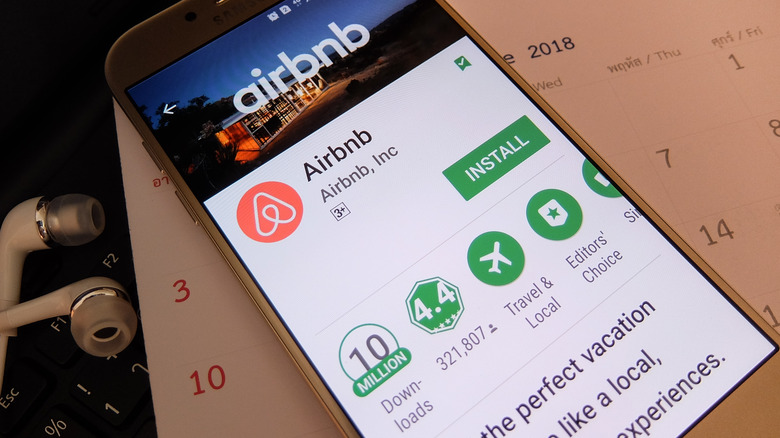Save On Airbnbs With This Simple Booking Hack
The travel industry rides the waves of dynamic pricing. If you can think of the global economy, specifically the rule of supply and demand, the travel industry is a microcosm of this principle. On one hand, dynamic pricing in the travel industry can be a bit frustrating, as it's not the easiest thing to predict. The entire travel media sphere attempts to explain when, where, and how you'll get the best price. On the other hand, compared to other industries, the travel industry is a bit easier to predict, and quality travel media outlets and agents do a good job helping travelers find deals or better understand why certain hacks and tips work.
There are always exceptions to any specific travel-planning rule, but in broad strokes, the dynamic pricing trends of hotel accommodations are perhaps the easiest to predict. Unless there's a reason accommodations will be scarce — i.e., you're traveling during peak tourist season, a concert is in town, or it's a particularly popular hotel or locale — then you can typically find a better price by booking hotels at the last minute. While this pricing principle is broadly true for hotels, Airbnb prices are a bit different.
Airbnb falls outside of price prediction models
Hotel rooms will be more expensive when scarce. That's dynamic pricing. But all things being fair, you'll typically find a cheaper hotel room when hoteliers are trying to fill rooms. At the end of the day, hotels work on occupancy rates, and an empty hotel room doesn't pay the bills. As far as Airbnb, peer-to-peer accommodations are a tad trickier.
Airbnb and other peer-to-peer accommodation platforms aren't part of the commercial industry, so what may be broadly true, insomuch as a hack, about saving by booking a hotel last minute, won't typically translate to a peer-run accommodation. That said, an Airbnb host can allow the platform to take full reins in pricing their accommodations through the platform's own dynamic pricing model. While last-minute booking may work because of sheer supply-and-demand principles, there's actually data that suggests a more prime time to save when booking an Airbnb, especially when Airbnb — not the host — is in charge of pricing.
One month out may be best bet
According to Nerdwallet, you'll save an average of 13% off hotels when booking last minute. Of course, this is an industry average, and specific cases will vary. With this in mind, Nerdwallet conducted further research concerning Airbnb bookings. Studying 10 major U.S. cities, they compared the prices of booking three days in advance, four weeks in advance, and nearly a year in advance (47 weeks).
Nerdwallet found that Airbnb prices, with 84% of hosts utilizing the platform's dynamic pricing, were the cheapest one month out versus last minute. While this bucks the trend of last-minute savings on hotels, it's important to note the dynamic pricing model of Airbnb's platform, since 84% of the hosts utilized the feature. Within their platform, data showed that booking one month out offered the best prices. That said, you can definitely also save by booking an Airbnb last minute. It just depends.
Interestingly, a non-professional Airbnb host is probably more aligned with a professional hotelier's considerations than Airbnb's model. When it's up to the host, they may drop prices significantly on their own, as an empty room doesn't make any money. On paper, Airbnb doesn't seem to follow hotel price trends, but one cool thing about a peer-to-peer platform is that it's full of peers. Simply email and politely ask if the host offers any last-minute rates. This answer is impossible to predict.


